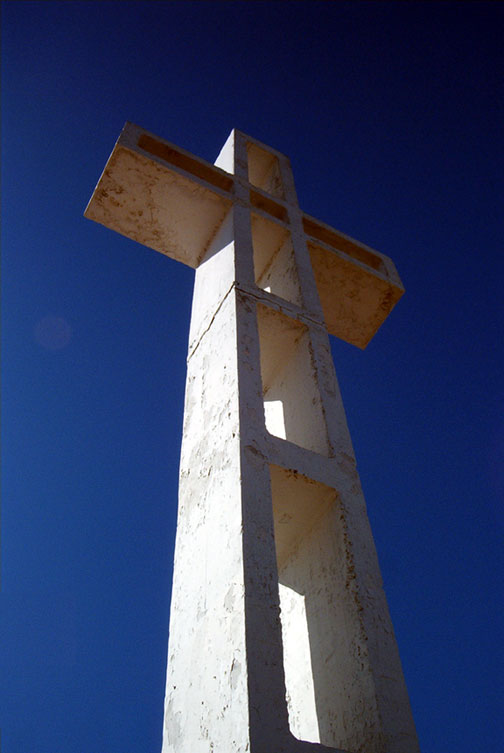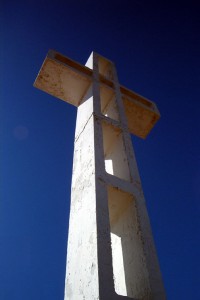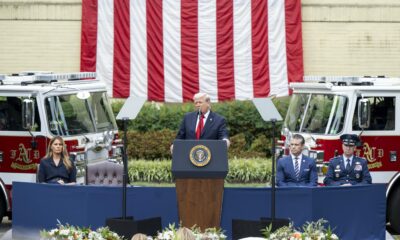Constitution
Will the High Court Adopt the Coercion Test?

As the American Civil Liberties Union prowls the land to muzzle public prayers, rip out Ten Commandments monuments and terrify small towns over nativity scenes, help may be on the way from the U.S. Supreme Court.
Later this year, the Court may decide to hear arguments for and against tearing down the 44-foot cross at the Mt. Soledad veterans memorial in San Diego.
Arguments before the Supreme Court
The ACLU says the cross, first erected in 1913 and rebuilt twice, is an unconstitutional establishment of religion. You can see the cross clearly at the top of a mountain from the San Diego Freeway, and it offends and traumatizes ACLU lawyers every time they glimpse it. Some bravely make it through that stretch while clutching their hearts, while others narrowly miss going off the road.
So far, ACLU lawyers have not claimed that this distracting edifice is a traffic hazard. Perhaps they’re afraid that someone might make that case against a Hooters billboard.
Given the ongoing harassment by atheist and leftist groups, what we need is a legal nuke to settle such matters – in favor of religious liberty. One would think the clear language of the First Amendment would be enough, but court rulings and ever-fresh, ACLU-generated cases suggest otherwise.
The Coercion Test — a nuke for religious freedom?
The answer might be “the Coercion Test,” a way to assess claims that does not distort the first part nor ignore the second part of the First Amendment’s guarantee that
Congress shall make no law respecting an establishment of religion, nor prohibiting the free exercise thereof….
Drafted as part of the American Civil Rights Union’s amicus brief in the Mt. Soledad case, the test adds crucial perspective. ACRU General Counsel Peter Ferrara, the brief’s author, explains:
At the time the First Amendment was adopted, the countries of Europe all had “Establishments of Religion,” which meant official government religions enforced by laws requiring attendance at the official church, regular contributions to it, and other preferences in law for members of that church. These establishment policies all involved government coercion to force citizens to support the one favored church. Almost all of the American colonies had such establishments as well, with legal compulsion or coercion as their hallmark.
These practices, and anything like them involving coercion in regard to religion, are what the framers meant to prohibit in adopting the Establishment Clause, for this is what an Establishment of Religion meant at the time. They did not mean, however, to prohibit any voluntary, public, religious speech, or religious expression or symbolism, which do not involve any such coercion.
In other words, James Madison and George Washington never intended to bring down the heavy hand of government on, say, Neptune Township, New Jersey, which the ACLU forced last May to cover a historic auditorium’s religious symbols for a high school graduation, breaking a nearly 70-year tradition. Or on veterans groups who raise money for memorial crosses to honor comrades who paid the ultimate price for our freedom.
In April 2010, the Supreme Court upheld the right of a veterans group to maintain a 7-foot memorial cross in the Mojave National Preserve in California. The cross had been offending an ACLU member and park employee who had retired and moved to Oregon but was still annoyed.
Last year, the Supreme Court forsook an opportunity to clarify this issue when it chose on Oct. 31 not to hear an appeal of a ruling against a Utah group that raises 12-foot-crosses in roadside memorials to fallen state troopers.
The Court’s inaction surprised some observers because in the Mojave case, Salazar v. Buono, the majority opinion written by Associate Justice Anthony Kennedy seemed to welcome the state trooper issue:
A cross by the side of a public highway marking, for instance, the place where a state trooper perished need not be taken as a statement of governmental support for sectarian beliefs.
It’s a fair bet the Court skipped the Utah case because the Mt. Soledad case has better circumstances for clarifying the right to public religious expression.
Despite what most law schools teach, the key to a durable standard is not precedents but the language of the Constitution itself and the Founders’ intentions.
Even Justice William Brennan, who championed the corrosive idea of the “living Constitution,” said in a 1963 concurring opinion striking down a Pennsylvania requirement for Bible reading in schools (Abington School District v. Schempp):
The line we must draw between the permissible and the impermissible is one which accords with history and faithfully reflects the understanding of the Founding Fathers.
Well, devotees of the “living Constitution” can be right at least some of the time. Brennan throwing a crumb here is a bit like the villain Lex Luther committing a random act of kindness.
Public religious expression has long been a fixture in American life. As Ferrara notes, “The very next day after the House of Representatives of the First Congress voted to adopt the Establishment Clause, the House adopted a resolution requesting President Washington to proclaim ‘a day of public thanksgiving and prayer, to be observed by acknowledging the many and signal favors of Almighty God.’”
In his 1998 book Religion and the Founding of the American Republic, James Hutson, a Library of Congress historian, made an incontrovertible case that religion was central to the nation’s founding and functioning. He noted that church services were held in the U.S. House chambers up to the Civil War, and afterward, including on May 13, 1866, “when Congress passed the Fourteenth Amendment, which, according to some later judicial theories, forbids religious activities on public property.”
Since English colonists founded Jamestown in 1607, public expressions of faith have been common. It’s been fairly recently, since liberals fabricated an un-American distortion of the “separation of church and state,” that the ACLU has been able to drive religion – and Christianity in particular – out of the public square.
The Coercion Test may be just the ticket to restore sanity and genuine freedom of religious expression.
Robert Knight is a Senior Fellow for the American Civil Rights Union and a columnist for the Washington Times. This article originally appeared here.
[amazon_carousel widget_type=”ASINList” width=”500″ height=”250″ title=”” market_place=”US” shuffle_products=”True” show_border=”False” asin=”184902670X, 1932225412, 1932225277, 1932225633, 193222503X, 145071398X, 1604592680, 0925279366, 0915815710, 1932225099″ /]

-

 Accountability3 days ago
Accountability3 days agoWaste of the Day: Principal Bought Lobster with School Funds
-

 Executive1 day ago
Executive1 day agoHow Relaxed COVID-Era Rules Fueled Minnesota’s Biggest Scam
-

 Civilization8 hours ago
Civilization8 hours agoWhy Europe Shouldn’t Be Upset at Trump’s Venezuelan Actions
-

 Constitution2 days ago
Constitution2 days agoTrump, Canada, and the Constitutional Problem Beneath the Bridge
-

 Civilization1 day ago
Civilization1 day agoThe End of Purple States and Competitive Districts
-

 Christianity Today7 hours ago
Christianity Today7 hours agoSurprising Revival: Gen Z Men & Highly Educated Lead Return to Religion
-

 Civilization5 days ago
Civilization5 days agoThe devil is in the details
-

 Executive20 hours ago
Executive20 hours agoWaste of the Day: Can You Hear Me Now?











OK, so if it’s illegal to pray in public and stuff like that….does that mean that the muslims have to get out of public streets and stick their buttocks up in the air elsewhere?……like in private?
Tonto USA –
I think that we all know that the “honorable” high Court (or, at least the lib justices) will allowances for the secularized religion of American political correctness and multiculturalism to be practiced, at all costs!
I can only assume you’re playing devil’s advocate here, but I’ll play along for now.
Nobody is “prowl[ing] the land to muzzle public prayer”. Rather, people are trying to ensure the Constitution is obeyed.
The Constitution’s Establishment Clause prevents favouritism of one religion over another. Organisations like the Freedom from Religion Foundation exist to try to ensure this is the case. That means, for instance, that a town can’t sponsor a Christian display unless it is also prepared to sponsor a Jewish one, an Islamic one, a Hindu one, an Atheist one… etc. You’re allowed to say prayers – just keep them off the official agenda. Or, you can call it something other than prayer and allow other groups to lead a “moment of reflection”. An aside: I think the phrase “moment of reflection” is an awful one, but I’m going with the flow for a while.
So to Tonto’s original point: if a Christian or Muslim wants to pay in public, they have now – as they have always had – a right to do so. You are complaining about nothing.
I must dispute that. Organizations like the Freedom From Religion Foundation assert, mendaciously, that the Establishment Clause means that atheism shall be the default in the public square.
I hate to break this to you, but God is Real. If you doubt that, point your browser to the Creation Corner tab. I have covered that subject rather extensively.
And I also find it mendacious of you to represent the FFRF’s goal as anything other than to establish atheism as the official State anti-religion.
[…] R. (2012). WILL THE HIGH COURT ADOPT THE COERCION TEST? Available: link to cnav.news. Last accessed 17th Mar 2012. Share this:FacebookLike this:LikeBe the first to like this […]